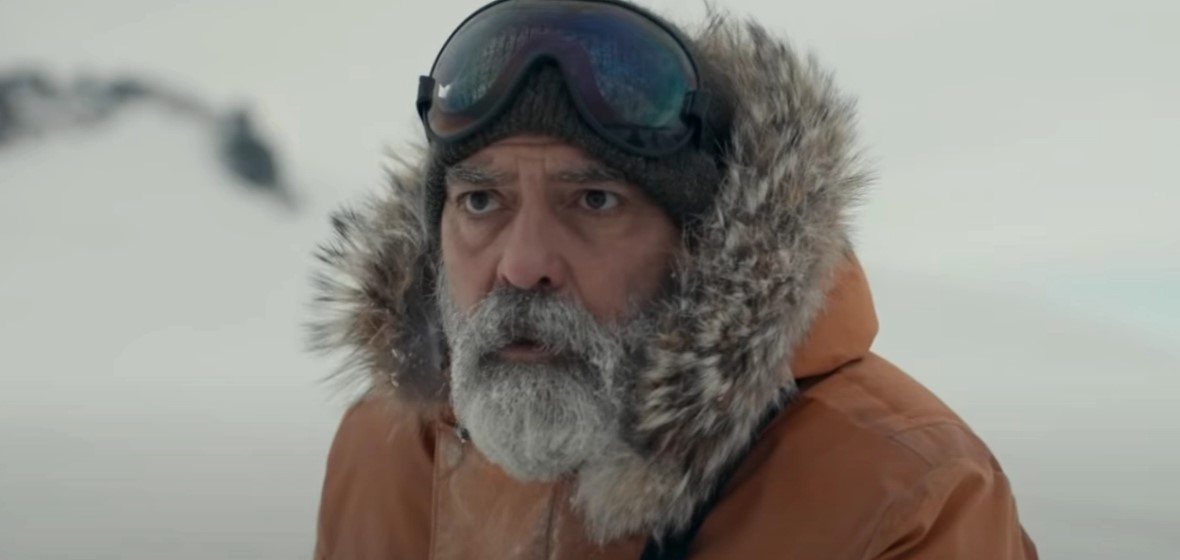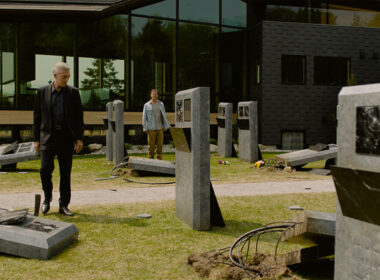Rating: ***
I admire the confidence of a film that starts with the words “three weeks after the event”, without giving you any context. David Simon’s underrated TV series Treme starts with “six months later” even before the first frame, but the audience know what a show about New Orleans would refer to. There’s nothing like that in The Midnight Sky. What is this ‘event’? What does it have to do with this lonely, bearded man? For all that is worth, what planet are we on?
We quickly find out there was an environmental catastrophe and all of humanity had to find shelter underground. That is, except for Augustine (George Clooney), a dying scientist who stays behind in an Arctic communications facility in case there are any astronauts left in space who need help coming back to Earth or steering away from it.
The in-need astronauts are a team returning from a mission in a newly discovered moon of Jupiter that, as luck would have it, has conditions to support human life. They don’t know about the “event” and can’t communicate with anyone back home, including our lonely hero; who by then has realised that he needs to track across the Arctic circle to reach a facility with an even larger dish. Bit of an oversight not being stationed there, to begin with, but maybe he wasn’t expecting to contact anyone, let alone have to face the outside world again.
The film cuts between Augustine and the returning astronauts without much fanfare. On Earth, the story is focused on Augustine’s perilous journey, aggravated even further when he finds a mute child left behind that he now must care for. In space, though, ignorance is bliss. The crew is a generic group whose personalities are barely defined beyond the one trait – there’s the pregnant one (Felicity Jones), the two family men eager to return to their loved ones (Kyle Chandler and Demian Bichir), the other lady (Tiffany Boone), and the Captain who is also the father of Jones’ child (David Oyelowo).
Thanks to a thorough arc, the sequences in Earth are more compelling, even if sometimes ridiculously far-fetched (the last segment of the journey is an impossible series of events that would’ve killed even the healthiest man, let alone one attached to a portable chemotherapy machine). Space is a more mundane affair, slowly pacing to the big reveal. There is a small tense moment that seems to be there for no other dramatic purpose but to add action to that page of the script.
And here lies the biggest problem of The Midnight Sky. For all its good intentions, the script feels like it’s built from a producer’s checklist of ‘serious and prestigious sci-fi for the awards season’. It’s a portmanteau of other recent films likes Gravity, Arrival and The Revenant but without the emotional heft those films carried.
The story punctuates effective action sequences on the beat, though it’s often disconnected from the other story elements – especially character development. If there is an emotional connection to gain from it all, it comes exclusively because of the cast. Sometimes we get a flashback, or two strange sequences where the family men reassert their ‘familiness’ by spending time with hologram versions of their wives and children. Their final actions, like Augustine’s, are a vindication of themselves as men, fathers, and husbands: strong-willed all-American heroes who face all adversities to protect what’s left of humanity. The women, on the other hand, are reduced to either mothers, or daughters, or dead. It’s all very surface level.
Ultimately The Midnight Sky is not a failure but a missed opportunity. It exists in much better films that came before, and even if all the actors are terrific in their roles, especially Clooney and Bichir, it is not deep enough to be memorable. Fittingly weightless for a film set in space.
The Midnight Sky is now streaming on Netflix.




